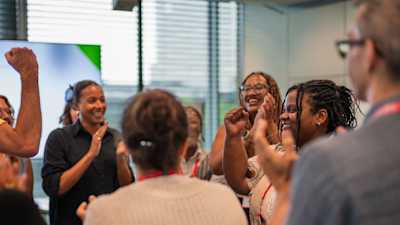By Amir Rizwan
Around three years ago I stepped into Comic Relief to take on the exciting opportunity to kick start the foundation's work on social investment.
A few months before I had been reflecting on where I would go next in my career after 4 years at CAF Venturesome when an opportunity popped up to manage something called Red Shed, Comic Relief’s new social investment venture.
Since joining Comic Relief to my last day here it has been an amazing opportunity for me to better understand social investment, how it can work for funders and most importantly what it needs to do to better serve the needs of social organisations.
I am delighted to share my reflections on what has gone well, the challenges and what I have learnt from my three years here at Comic Relief.
What has gone well
Well, firstly we have shown that doing social investment for the first time doesn't lead to the roof collapsing. I am immensely proud of the fantastic portfolio we have built using a variety of social investment tools. Red Shed has shown the way for the sector in being able to tailor its investment products to the needs of its investees (a good example of this is the interest-free loan we provided to RefuAid and the equity investment we have made to Luminary Bakery).
Through its approach, we have managed to work and invest alongside other social investors showcasing the ability we have had to leverage in more funding to support social change through our approach to co-investment. This has led us to invest alongside Big Issue Invest, Clothworkers Foundation, Barrow Cadbury Trust, City Bridge Trust and Joseph Rowntree Foundation.
The catalytic nature of our approach to social investment has enabled organisations to grow and take on new investment as a result of the risk we have taken to support them at the early stages. Great examples of this include how RefuAid went on to take on new investments from other foundations and the investments we have made into impact funds such as the Fair by Design Fund & SASC Housing Fund going on to raise investment from new investors.
Despite the limited capacity and how new we are we have managed to provide thought leadership within the social investment sector through our work with networks like the SIIG at ACF and publications we have released such as our report on the perception of social investment by small charities(opens in new window).
Raising new funding from Maria Marina Foundation to support the social investment activity of Red Shed has demonstrated the potential that Red Shed has in helping Comic Relief attract new funding.
The challenges
Getting a long-standing grant funder like Comic Relief started on the journey to making social investment requires patience. This work inevitably leads to internal challenges especially for an organisation that has never made social investment before. This is a sector-wide challenge and not unique to Comic Relief. Whilst great strides were made by Comic Relief on this there is still more left to do on looking at how to improve the processes and systems that underpin this work.
How do you factor social investment into the wider strategy of a large scale funder? Initially, this was a challenge for me and led to Red Shed being seen as something of an odd outfit within Comic Relief. This is something that takes time to bed in and also offers a great opportunity to frame social investment as a complementary funding solution that can sit alongside grant funding. I’m pleased to say that social investment is here to stay at Comic Relief. But overall the sector still needs to do more to make the case for social investment within the trust and foundation space as opposed to those funders just sticking to their usual grant funding.
Going down the bespoke route where we listened to what organisations needed to tailor investment that meets their needs is resource-intensive and takes much longer compared to standardising the investment approach. How best do you offer an impact first approach while ensuring it is cost-effective and provides investment to front line organisations when they need it?
One of the biggest challenges that occurred was how to develop a portfolio of investees where we also ensure there was a good level of representation and diverse-led organisations. This is something which without intentionality built-in at the beginning is difficult to achieve and requires working with sector bodies and partner groups to ensure that connections are made with diverse led organisations to ensure social investment is reaching the grassroots.
What I have learnt (in summary it's loads!)
Social investment has an important role to play but it needs to ensure the impact is at the heart of it. This means designing and building products or investment solutions that meet the needs of social organisations and also continuing to listen to the front line.
Simple products are the way forward, we need more simple products such as interest-free loans or patient and flexible investment products that remove the complexity and unnecessary legal costs associated with making social investments.
Grantmakers such as Comic Relief and other trusts and foundations play an important role in bringing their learnings and experience in supporting social change to the social investment sector. More collaboration between the impact world and the investment world is where we need to go with all of this.
Investors need to give up more power if we are to develop a more equitable approach to social investment that has diversity and equality at its core. What are the barriers that we need to dismantle? Is it language, processes or just the nature of wealth and who sits on it?
Have fun. This was a piece of feedback Cliff Prior the ex-CEO of Big Society Capital mentioned when I spoke to him about what Red Shed was looking to do. What I have learnt is that it is possible to have fun and work with fantastic social change leaders to provide them with the investment they need to succeed.
So those are my thoughts. A big thank you has to go to a whole host of people across Comic Relief for their patience, support and curiosity in enabling me to have kicked this off for Comic Relief and build an exciting portfolio of social investments. It is heartening to see that Red Shed is now beyond the 'pilot phase' and is now a central part of its social change strategy. I will continue to support Red Shed from afar and am excited to see where it goes next.


